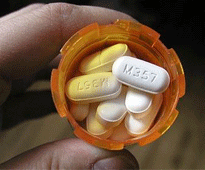fiercepharmaMarch 29, 2019
Tag: Generic , United Therapeutics , Remodulin
United Therapeutics has been bracing for copycat competition to its big moneymaker Remodulin, and now it's here. Novartis’ Sandoz launched a generic version of the pulmonary arterial hypertension drug this week, putting $500 million-plus in Remodulin sales at risk.

Sandoz’s generic should start eating away at the brand's revenues, which totaled $599 million globally last year, about $500 million of that in the U.S. But the real hit will come after the Novartis unit's six-month exclusivity expires and multiple generics drive prices down.
And the way UBS sees it, analysts may be underestimating just how much Remodulin sales will suffer this year, given a first generic rollout in March and more launches likely in September. And it won't help that Sandoz has partnered with rare disease commercialization specialist RareGen on its copycat rollout: That company's chief operating officer previously played a role in marketing Remodulin, the analysts wrote in a Wednesday investor note.
Consensus estimates have Remodulin sales declining about 10% in the U.S. this year, the UBS analysts said. They believe the figure is "relatively conservative given the timing of the launch this early in 2019." And Remodulin accounts for 37% of United's sales.
United Therapeutics did get something of a reprieve from copycat competition, though. It inked a patent settlement with Sandoz back in 2015 to allow its Remodulin copy to launch last year, and the company inked other patent settlements with Teva, Par, and Dr. Reddy’s that would have allowed those companies to launch in December. But Sandoz didn't make it to market right away, and the clock didn't start ticking on its 180-day exclusivity until this week's launch, meaning the other generics makers still have to wait.
Behind Remodulin, other patent cliffs loom for United Therapeutics’ PAH drugs Tyvaso and Orenitram in 2026 and 2027, respectively, the company said in a recent SEC filing.
To cope with Remodulin's patent loss, United Therapeutics has been working to build out its business. Its core PAH business rolled out Tyvaso and Adcirca in 2009, and followed up with Orenitram in 2013. Together, those drugs pulled in $944 million last year, despite an Adcirca generic Mylan launched in August.
Outside of PAH, United Therapeutics launched Unituxin in 2015 to treat high-risk neuroblastoma. The drug generated $84.8 million last year.
Aside from its marketed drugs, last year the company "signed four major agreements to acquire new product candidates, including an in-licensing agreement for ralinepag, representing our largest deal to date," CEO Martine Rothblatt told analysts on the company’s fourth-quarter conference call. Ralinepag is a phase 3 PAH drug United licensed from Arena Pharmaceuticals in November for $800 million upfront, plus potential royalties and up to $400 million in milestones. The company continued to advance its internal pipeline as well, Rothblatt said on the call.
Register as Visitor to CPhI China 2019!

-----------------------------------------------------------------------
Editor's Note:
To apply for becoming a contributor of En-CPhI.cn,
welcome to send your CV and sample works to us,
Email: Julia.Zhang@ubmsinoexpo.com.


Contact Us
Tel: (+86) 400 610 1188
WhatsApp/Telegram/Wechat: +86 13621645194
Follow Us:




 Pharma Sources Insight January 2025
Pharma Sources Insight January 2025


